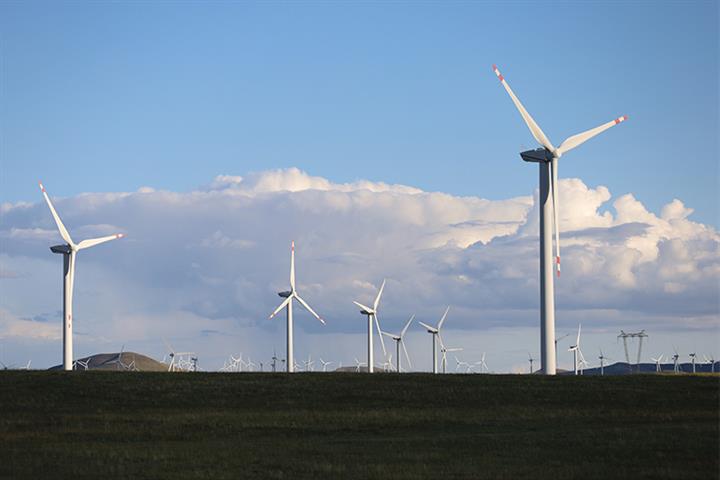 Renewables’ Share in Key Sectors Grows Apace During Energy Crisis, REN21 Report Says
Renewables’ Share in Key Sectors Grows Apace During Energy Crisis, REN21 Report Says(Yicai Global) March 31 -- The share of renewables in the total energy used by major sectors, which has been growing over the past decade, accelerated in the current global energy crisis, according to a new report from the Paris-based global renewable energy network REN21.
Renewables accounted for about 15.5 percent of the energy used in the world’s buildings in 2021, up from 11.1 percent in 2010, per the report published yesterday. In the industrial and agricultural sectors their share rose to 16.8% from 12.3% and to 15.4% from 10.2% between 2010 and 2020 respectively, while in transportation, with the lowest penetration rate, the figure was 4.1 percent, compared with 2.6 percent a decade earlier.
Higher energy costs and commitments aimed at tackling the climate crisis had a direct impact on the rising yet varying demand for renewables in those four end-use sectors, according to the report.
“Crises are also making policymakers realize that renewables are the cheaper, most reliable, decentralized, and equitable option,” REN21 Executive Director Rana Adib told Yicai Global.
Countries have come out with policy packages over the past year to counter market disruptions and speed the growth in production and use of renewable energy and the local manufacturing of renewable energy equipment. For example, the European Union introduced the REPowerEU plan to save energy and diversify energy supply through the installation of more rooftop solar panels and by increasing investment. The United States brought in the Inflation Reduction Act by which it has allocated USD 433 billion in new spending and tax credits and addresses all main energy demand sectors.
But renewables still face barriers. Governments are sending mixed signals, according to Adib. They put in place policies favoring renewables, while pursuing fossil fuel subsidies and projects, she said. So enhancing cooperation between countries in a renewable energy regime and in the international trade of green energy is a necessity.
Speaking about the ChatGPT craze, Adib said “innovation is always a strong arm for renewables expansion.”
REN21, founded in 2005, is a non-governmental organization centering on renewable energy in all sectors. The Renewables 2023 Global Status Report published yesterday is the first in a series of eight in the think tank’s GSR2023 Collection. More will be released by June.
Extracts from Yicai Global’s interview with Adib are below.
Yicai Global: You said it had taken a crisis for the world to finally turn to renewables. Please could you elaborate on that?
Rana Adib: Crises are creating a sense of urgency to shift to renewable energy. Crises are also making policymakers realize that renewables are the cheaper, most reliable, decentralized, and equitable option. Renewables are decentralised and liberate countries from dependency on sole and centralised suppliers like the Russian Federation, Saudi Arabia or others, which provides more energy security. They emerged as a critical instrument to respond to the current crises and in the face of the current crises, they are demonstrating that a sustainable energy transition is possible.
Policy frameworks in response to crises are galvanizing the transition, such as the Inflation Reduction Act in the US and the REPowerEU.
YG: What is blocking the international trade in renewables?
Adib: The main block is short-termism. Politicians with close ties to the fossil fuel industry are blocking progress and policies that favor renewables. Fossil-fuel subsidies are one of the biggest financial barriers hampering the world’s shift to renewable energy. The International Monetary Fund says that about USD 1 trillion was spent on subsidizing the fossil fuel industry in 2021 alone, including through explicit subsidies, tax breaks, and health and environmental damages that were not priced into the cost of fossil fuels.
Political will is therefore a main barrier to renewables expansion. Governments are sending mixed signals. On the one hand they enact policies and make international commitments that favor renewables, but on the other they pursue fossil fuel subsidies and projects.
YG: How can the share of renewables used in transportation be increased?
Adib: The challenge of reducing fossil fuel subsidies remains a major hurdle for effective penetration and adoption of renewable energy sources in the transportation sector.
In the transport sector, oil continues to dominate. In these sectors, deeper penetration of renewables, expanded electrification and improvements in energy efficiency can play a crucial role in alleviating concerns about prices and security of supply.
Electric vehicles, including two and three-wheelers and buses, and their charging infrastructure are experiencing rapid growth, with a 54 percent year-on-year increase in investment, particularly in Asia. This is positive provided it is accompanied by a transition to renewable power to ensure EVs are charged using renewable sources.
But this is not enough and not the correct path towards sustainable transport. To achieve sustainable transport, countries and users must reduce demand and travel and resort to walking, cycling and public and rail transport as a priority. EVs and bans on combustion engines should only come after the first measures towards sustainable transport are taken.
YG: What could a ChatGPT-like AI bring to the renewables field?
Adib: Innovation is always a strong arm for renewables expansion, so it will be helpful especially creating societal support for renewables and debunking myths and misconceptions about renewable energy is critical for its expansion.
Editor: Tom Litting